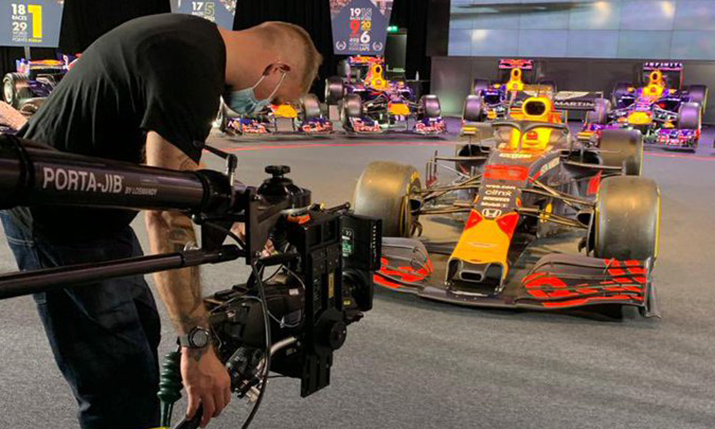COVID-19 and the evolution of sports broadcasting

By Ed Tischler, managing director for UK and Europe, Gravity Media Group
2020 has been a year like no other for the sports television broadcasting world. Here in Europe we have seen lockdowns and the postponement or even cancellation of all sports, to the joy of seeing the restart of live sport once again, only to now be facing further restrictions and lockdowns throughout Europe as winter hits.
While technology has pole-vaulted forwards during this period to enable self-isolating individuals to continue to produce spectacular sporting experiences for viewers whenever possible, both live and archive, the pandemic is now impacting more than whether sport is live or not.
The logistics and cost of moving people and equipment between events on this continent is an ever-changing, daily escalating, complex headache for many of the companies in this industry. On top of that, people themselves are suffering emotionally from the stress of trying to keep going in this pandemic.
Tricky year for all
For the people at the heart of sports broadcasting, it has been a tricky year for many. Swathes of people have been furloughed and many have not yet been bought back, or have been let go as part of cost saving necessities.
And for the thousands of freelancers that keep this industry going in good times, most have fallen through all the financial safety nets during this pandemic, leaving them with no income whatsoever. Managing on a reduced wage, or no wage at all, is not an easy task.
Even for those who have been able to continue working throughout Europe’s lockdowns, it has not been easy. Those people have had to create and adapt to entirely new ways of working while trying to stay healthy – physically and mentally – and also supporting friends and colleagues who were furloughed or let go.
Over the last few years, mental health has finally become a topic that people are more comfortable talking about in public, and about time too. Businesses in sports broadcasting should be focusing on making sure their crews and colleagues are supported mentally as well as physically, and that they have access to someone trained that they can talk to.
The next thing on the pandemic agenda is set to be the issue of burnout, so we need to be looking at making sure people get what they need to stay on track and focused.
Logistical nightmare
From the people at the heart of sports broadcasting, to the issue of actually getting them to and from events today, and onto the next one. Before the pandemic, we were able to set up crews and send them off to events across borders, knowing that as soon as that event wrapped, that same crew could ship out and over another border (or 10!) and start working on the next event within days.
Today we are facing a very different story. Every country, and indeed often every county, now has its own rules and regulations. From different tiers to different quarantine regulations, moving from country to country within Europe alone is now extremely difficult.
This has forced us to try to set up multiple crews to do jobs that before one crew could have done, knowing that each group will need to self isolate or quarantine not only after an event has ended, but beforehand.
We also have to ask those staff to isolate from their family and friends within this process to protect them and prevent any cross-contamination during those before and after periods, which again takes an emotional toll.
Yet is not only the people issue here. With less planes in the sky, there is less cargo space for kit. That means the cost of shipping kit to different sporting locations rises exponentially as specially chartered planes are required, or simply the cost of sort-after square footage on a jet goes up simply, well, because it can.
Hope and learning
Ultimately, the culmination of all these areas is adding an even heavier burden onto the businesses behind great sports broadcasting. However, in the same year that Gravity Media as a brand has turned one year old, there is hope, and learning.
What have we learned from 2020 that we, the sports broadcasting industry, can take forward into 2021, and even beyond?
People need our support and help, both financially and mentally. This is about wellbeing and treating people as individuals, with respect and care. While we have to work with multiple crews in order to cover sports events that previously could have been done with one, we need to make sure we keep the people we need in this industry so that one day we can return to a more normal way of working, with all the people we need.
We need to think more smartly in our planning to be able to cover live sporting events. Today we face a barrage of constantly changing rules and regulations that have been put in place to keep people safe. These complexities mean that we are now learning to think more cunningly than we ever have before when plotting out how to use our resources to get people and kit from A to B, and onto C, D, and E which are happening simultaneously.
This is knowledge that we can take forward beyond this pandemic, to streamline what we do and how we do it, to create new efficiencies, and to grow our businesses once more.
Our end game here is to entertain fans, to bring new fans on board, to increase viewership, and to take people away from the daily slog and into worlds of teams and champions, thrills, rivalries and excitement.
We have managed to keep that happening despite all the curveballs that have been thrown at us in 2020, and there have been many. We will adapt and grow and come out of this stronger.
